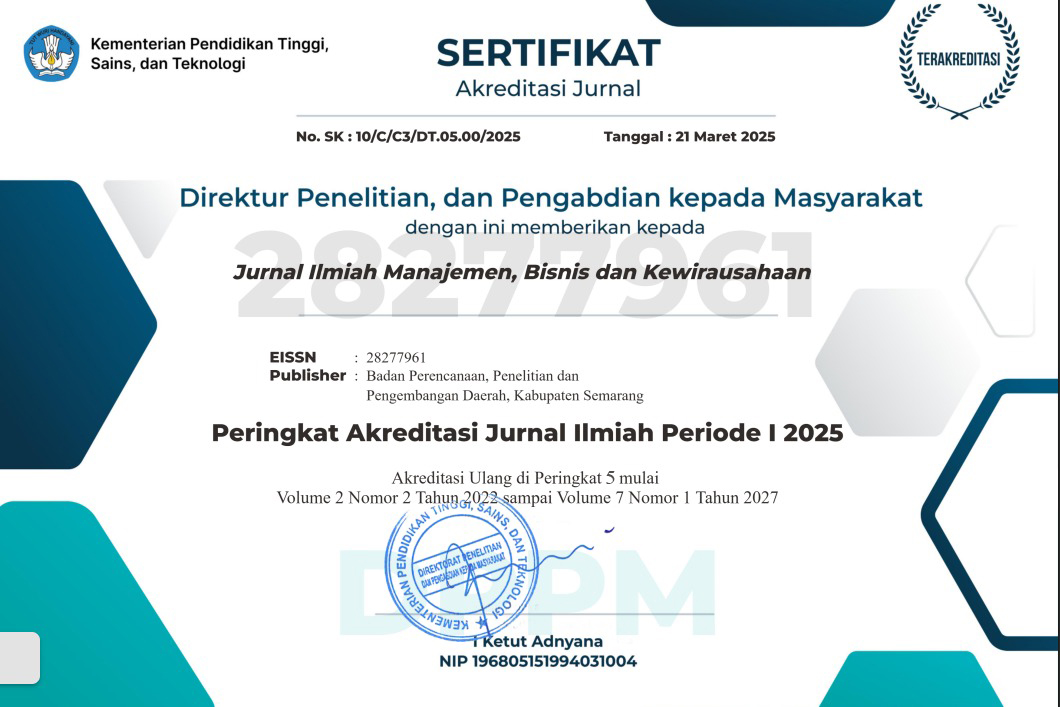Pengaruh Career Development Terhadap Job Satisfaction pada Mahasiswa Karyawan
DOI:
https://doi.org/10.55606/jurimbik.v5i2.1524Keywords:
Career development; Job satisfaction; Regression analysis; Working StudentsAbstract
Job satisfaction is an expression that indicates satisfaction with the results of an evaluation of work and its characteristics. Career development is one of the factors of job satisfaction. Career development is a continuous process in which individuals acquire the skills, knowledge, and experience necessary to achieve their career goals. The purpose of this study is to determine the effect of career development on job satisfaction among student employees in Greater Jakarta. The sample in this study consisted of 109 student employees selected using non-probability sampling, specifically purposive sampling. Confirmatory Factor Analysis (CFA) was used to test the construct validity of each variable. Statistical testing using multiple regression analysis was employed to examine the influence of the independent variable (career development) on the dependent variable (job satisfaction). The results of the study indicate that there is a significant influence of career development on job satisfaction with an R Square proportion of 30.4%. For further research, it is recommended to investigate whether human resource management is a factor that strengthens or weakens the influence of career development on job satisfaction. Additionally, companies are advised to enhance their perception of the value of career development to further increase job satisfaction among employees.
References
Bakker, A., & Leiter, M. (2010). Work Engagement: A Handbook of. Essential Theory and Research. Psychology Press.
Baruch, Y. (2001). Employability: A substitute for loyalty? . Human Resource Development International, 4(4), 543–566.
Baruch, Y., & Peiperl, M. (2000). Career management practices: An empirical survey and implications. Human Resource Management, 39, 347–366.
Benson, G. (2003). Examining employability: Effects of employee development on commitment and intention to turnover. Academy of Management Best Conference Paper, C1–C6.
Brayfield, A. H., & Rothe, H. F. (1951). An index of job satisfaction. Journal of Applied Psychology, 35(5).
Chen Z, Wakabayashi, M., & Takeuchi, N. (2004). A comparative study of organizational context factors for managerial career progress: Focusing on Chinese state-owned, Sino foreign joint venture and Japanese corporations. International Journal of Human Resource Management, 15(4), 750–774.
Dewi, R. S., & Nurhayati, M. (2021). The effect of career development on turnover intention with job satisfaction and organizational commitment as mediators, study at pt control systems arena para nusa. European Journal of Business and Management Research, 6(4), 11–18. https://doi.org/10.24018/ejbmr.2021.6.4.918
Evanda, R. (2017). Pengaruh motivasi, pengembangan karir terhadap kepuasan kerja dan kinerja perawat di Rumah Sakit dr.Soebandi Jember. Jurnal Bisnis Dan Manajemen, 11(1), 41–49.
Febrianti, N. T., Suharto, S., & Wachyudi, W. (2020). The effect of career development and motivation on employee performance through job satisfaction in pt jabar jaya perkasa. International Journal of Business and Social Science Research, 25–35. https://doi.org/10.47742/ijbssr.v1n2p3
Fenton-O’Creevy, M., Winfrow, P., Lydka, H., & Morris, T. (1997). Company prospects and employee commitment: An analysis of the dimensionality of the BOCS and the influence of external events on those dimensions. British Journal of Industrial Relations, 35(4), 593–608.
Firkola, P. (1996). Career development practices in a Japanese steel company. Best Paper Proceedings: Association of Japanese Business Studies, 113–132.
Hasibuan, & Malayu, S. P. (2007). Manajemen Sumber Daya Manusia Perusahaan. PT. Bumi Aksa.
Jayani, D. H. (2021, May 3). Sebanyak 6,98% Pelajar di Indonesia Sekolah Sambil Kerja. Databoks.
Lee, C., & Bruvold, N. (2003). Creating value for employees: Investment in employee development. International Journal of Human Resource Management, 14(6), 981.
Li, K. S., Tong, C., & Wong, A. (2014). The impact of career development on employee commitment of part-time faculty (ptf) in hong kong’s continuing professional development (cpd) sector. British Journal of Education, Society & Behavioural Science, 4(1), 52–73.
Mangkunegara, A. P. (2015). Manajemen sumber daya manusia perusahaan. Remaja Rosdakarya.
Pratiwi, F., & Lo, J. S. (2020). ob satisfaction as a mediator of effect job stress and career development on employee turnover intention PT PKSS. Dinasti International Journal of Digital Business Management, 1(4), 580–592. https://doi.org/10.31933/DIJDBM
Rachmad, Y. E. (2022). Career Development Theory. Reims Champagne Éditions Internationales, Édition Spéciale 2022. https://doi.org/10.17605/OSF.IO/TZAE5
Robbins, S. P., & Judge, T. A. (2015). Perilaku organisasi: organizational behavior (16th ed). Penerbit Salemba Empat.
Seno, Magito, & Hikmah Perkasa, D. (2023). The influence of career development, competence and work conflict on job satisfaction. Talent: Journal of Economics and Business, 1(1), 14–22. https://lenteranusa.id/
Sinval, J., & Marôco, J. (2020). Short index of job satisfaction: Validity evidence from Portugal and Brazil. PLoS ONE, 15(4). https://doi.org/10.1371/journal.pone.0231474
Sopiah. (2011). Perilaku Organisasi. ANDI.
Wau, J., & Purwanto, P. (2021). The effect of career development, work motivation, and job satisfaction on employee performance. Jurnal Aplikasi Bisnis Dan Manajemen. https://doi.org/10.17358/jabm.7.2.262
Widyautami, P. A. (2025). Stres kerja, experiential avoidance dan strategi coping : studi kasus pada pekerja di panti werdha “x.” Eudaimonia Journal Psychology Universitas Sains Indonesia, 2(1).
Downloads
Published
How to Cite
Issue
Section
License
Copyright (c) 2025 Jurnal Ilmiah Manajemen, Bisnis dan Kewirausahaan

This work is licensed under a Creative Commons Attribution-ShareAlike 4.0 International License.










